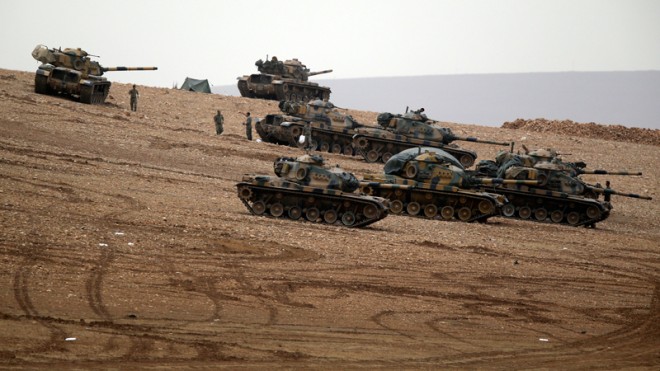US says Turkey OKs use of bases against ISIS

Turkish soldiers hold their positions with their tanks on a hilltop on the outskirts of Suruc, at the Turkey-Syria border, overlooking Kobani, Syria, during fighting between Syrian Kurds and the militants of Islamic State group, Sunday, Oct. 12, 2014. Kobani, also known as Ayn Arab, and its surrounding areas, has been under assault by extremists of the Islamic State group since mid-September and is being defended by Kurdish fighters.(AP Photo/Lefteris Pitarakis)
ABOARD A US MILITARY AIRCRAFT — Turkey will let U.S. and coalition forces use its bases, including a key installation within 100 miles of the Syrian border for operations against Islamic State militants in Syria and Iraq, American defense officials said Sunday.
The Obama administration had pressed Turkey for a larger role against the extremists, and a senior U.S. official confirmed Saturday that Ankara had agreed to train and moderate Syrian rebels on Turkish soil. A Turkish government official said Sunday that Turkey put the number at 4,000 opposition fighters and said they would be screened by Turkish intelligence.
U.S. Defense Secretary Chuck Hagel, who has been traveling in South America, has said the U.S. wanted access to the Turkish air bases, including one at Incirlik in southern Turkey, from which to launch strikes against the Islamic militants.
That base is part of the agreement, according to U.S. defense officials who spoke on condition of anonymity because they were not authorized to discuss private talks between the Americans and Turks.
Beyond the training and bases, there are other issues the U.S. hopes Turkey will agree to. U.S. officials have not said what all of those would be because discussions are continuing. The militants have taken over large swaths of Iraq and Syria and driven refugees into Turkey.
Article continues after this advertisementHagel spoke by telephone Sunday with Turkey’s defense minister, Ismet Yilmaz, and thanked him for his country’s willingness to assist in the fight against Islamic State militants.
Article continues after this advertisementRear Adm. John Kirby, the Pentagon press secretary, said Hagel “noted Turkey’s expertise in this area and the responsible manner in which Turkey is handling the other challenges this struggle has placed upon the country, in terms of refugees and border security.”
Earlier, President Barack Obama’s national security adviser, Susan Rice, made clear that the U.S. has not asked “the Turks to send ground forces of their own into Syria.”
American officials are “continuing to talk to the Turks about other ways that they can play an important role. They are already essential to trying to prevent the flow of foreign fighters” and extremists from exporting oil through Turkey. “So Turkey has many ways it can contribute,” Rice told NBC’s “Meet the Press.”
Turkey and other American allies are pressing the U.S. to create a no-fly zone inside Syrian territory, and seeking creation of a secure buffer on the Syrian side of the border with Turkey. A “safe zone” would require Americans and their partners to protect ground territory and patrol the sky, meaning enforcement of a no-fly area.
Hagel has said American leaders are open to discussing a safe zone, but creating one isn’t “actively being considered.”
Gen. Martin Dempsey, the chairman of the Joint Chiefs of Staff, has estimated it would require hundreds of U.S. aircraft and cost as much as $1 billion a month to maintain an area in Syria safe from attacks by the Islamic State group and Syria’s air force, with no assurance of a change in battlefield momentum toward ending the Syrian civil war.
“Do I anticipate that there could be circumstances in the future where that would be part of the campaign? Yeah,” Dempsey told ABC’s “This Week.”